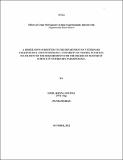UNNSpace Repository
Effects of Crude Oil Exposure on Rats Experimentally Infected with Trypanosoma brucei brucei
JavaScript is disabled for your browser. Some features of this site may not work without it.
Effects of Crude Oil Exposure on Rats Experimentally Infected with Trypanosoma brucei brucei
Ezeh, Ikenna Onyema
Date:
2012-10
Abstract:
This study investigated the effect of exposure to crude oil on rats experimentally infected with Trypanosoma brucei brucei. Thirty (30) adult male albino rats weighing 165 ± 15.0g were used for the study. They were kept in metal cages in a fly-proof house and fed with proprietary rodent diet and given water ad libitum. The rats were divided into five groups (A-E) of six rats each. Groups A and B represented the uninfected-unexposed and infected-unexposed controls respectively, whereas groups C, D and E were exposed orally to 0.1, 0.2 and 0.4 ml of crude oil respectively every alternate day for three weeks. All rats were inoculated intraperitoneally (ip) with 0.3 ml suspension of a 10% washed sheep red blood cell (SRBC) and given a booster dose of SRBC seven days later. Groups B – E were later infected ip with Trypanosoma brucei brucei. Rectal temperature, packed cell volume (PCV), total and differential white blood cell (WBC) counts were monitored weekly. Parasitaemia was assayed daily while direct haemagglutination was evaluated weekly from the sixth week. In addition the serum activities of alanine aminotransferase (ALT), aspartate aminotransferase (AST) and alkaline phosphatase (ALP) as well as the serum levels of urea and creatinine were estimated. Data generated was analysed by analysis of variance (ANOVA) using SPSS version 15 for Windows. Variant means were separated by Duncan’s multiple range test. The results of the study showed an average pre-patent period of 5 days for all T. brucei brucei infected rats, with peak parasitaemia observed for groups B, C and E on day 10 post infection and a second wave from day 12 post infection until day 14 after which all the rats were humanely sacrificed. The parasitaemia of group D on the other hand peaked on day 11 post infection without remission. All T. brucei brucei infected rats (groups B, C, D and E) showed a significant increase (p<0.05) in the rectal temperature. All T. brucei brucei infected rats however, had a significantly lower (p<0.05) PCV than the uninfected control at week 10 of the experiment. Following exposure to crude oil, leukocyte count of rats in group E was significantly (p<0.05) higher than other treated groups and the controls at week 6 of the experiment. After infection with trypanosomes however, there were significantly lower (p<0.05) leukocyte counts in groups B – E than in the uninfected unexposed control at week 9. The antibody response to SRBC was significantly lower (p<0.05) at week 9-11 in the crude oil exposed groups than both the infected and uninfected controls. Whereas the infected control had lower geometric mean antibody titres (3.7) than the unexposed control (5.7), these responses were however higher than the exposed groups C, D and E (1.6, 1.2 and 1.4 respectively) at week 10. The serum levels of creatinine and urea in the crude oil exposed groups were significantly higher (p<0.05) than the uninfected unexposed control at week 8. There was a significantly higher (p<0.05) serum activity of ALP in group D at week 4 and groups C, D and E at week 8 than the controls. The serum activity of ALT and AST of all T. brucei brucei infected groups were significantly higher (p<0.05) than the uninfected-unexposed control at weeks 8 and 10. It was therefore concluded from the study that exposure to crude oil and infection with trypanosomes significantly reduced the ability of rats to mount protective immune responses, impaired liver and kidney function and also depressed the cellular components of immunity. Thus its use traditionally for the treatment of certain disorders is not recommended.
Files in this item
This item appears in the following Collection(s)
Search UNNSpace
Browse
-
All of UNNSpace
-
This Collection
